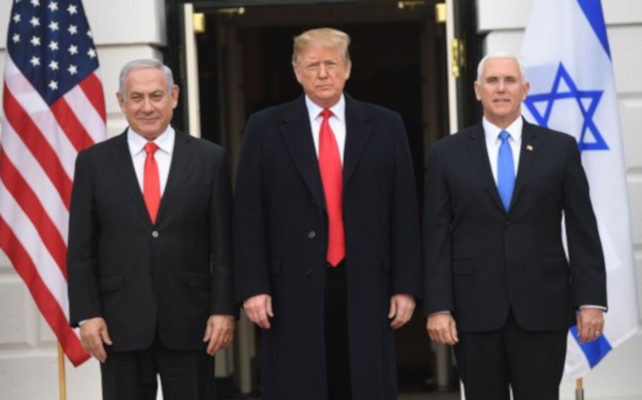
US President Donald Trump on Monday formally recognised Israeli sovereignty over the Israel-occupied Golan Heights, reversing decades of US policy.
The announcement came as Benjamin Netanyahu visited the White House in a trip the Israeli prime minister said he was cutting short after an early morning rocket, allegedly fired from the besieged Gaza Strip, struck a home in central Israel, wounding seven people.
Israel began striking Hamas targets in Gaza later on Monday, the Israeli military said. Hamas had earlier denied its movement was behind the overnight rocket.
Monday’s decree formalised Trump’s statement last week, saying it was time for the United States “to fully recognise” Israeli sovereignty over the Golan. The move appeared to give Netanyahu a boost ahead of the closely contested April 9 Israeli elections.
“This was a long time in the making…[it] should have taken place many decades ago,” said Mr Trump, as Mr Netanyahu looked over his shoulder.
Handing to the prime minister the pen he used to sign the declaration, Mr Trump added: “Give this to the people of Israel.”
Mr Netanyahu heaped praise on Mr Trump. Israel has never had a better friend than the US president, he said.
“Just as Israel stood tall in 1967, just as it stood tall in 1973, Israel stands tall today. We hold the high ground and we should never give it up,” Netanyahu said.
“Today, aggressive action by Iran and terrorist groups in southern Syria, including Hezbollah, continue to make the Golan Heights a potential launching ground for attacks against Israel – very violent attacks,” Trump said. “This should have been done numerous presidents ago.”
Not everyone celebrated the move.
Syria called the US action a “blatant attack” on its sovereignty and territorial integrity.
Arab League Secretary-General Ahmed Aboul Gheit, also condemned the move, saying Washington’s action did not change the area’s status.
Trump, who has shown robust support for his country’s close ally Israel, recognised Jerusalem as the country’s capital in 2017, defying international consensus and angering Palestinian leaders, who view Israeli-annexed East Jerusalem as the capital of their future state.

